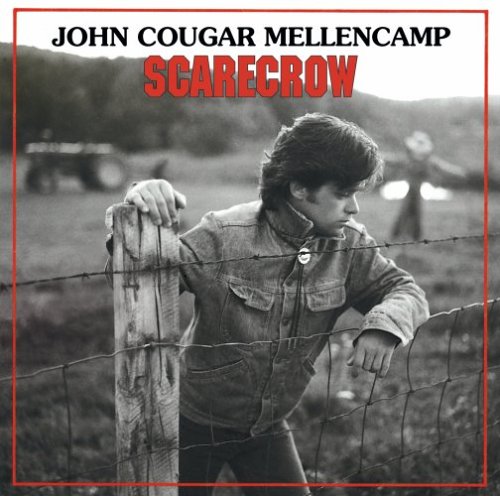
Scarecrow (1985)

1. Rain on the Scarecrow
2. Grandma's Theme
3. Small Town
4. Minutes to Memories
5. Lonely Ol' Night
6. The Face of the Nation
7. Justice and Independence '85
8. Between a Laugh and a Tear
9. Rumbleseat
10.You've Got to Stand for Something
11.R.O.C.K. in the U.S.A.
12.The Kind of Fella I Am
By 1985, John Mellencamp had fully shed the image of industry creation and emerged as a fully realized artist—one with a clear voice, a defined identity, and, for the first time, a broader mission. Scarecrow is the album where all the elements of his career came together: the gritty Midwestern rock, the populist messaging, the autobiographical storytelling. More than just a collection of strong songs, it plays with the cohesion and emotional arc of something far greater. If it isn’t quite a concept album, it’s certainly an album with a conscience.
Thematically, Scarecrow casts a wide net, but it returns often to the struggles of rural America—particularly the plight of the American farmer. Rain on the Scarecrow, the opening track, sets the tone with startling clarity: a hard-edged, unflinching indictment of economic collapse and institutional failure. It’s a bitter, furious song—one of Mellencamp’s finest—and it announces that the stakes are higher now. The small towns of Mellencamp’s earlier records haven’t just faded into the background—they’re in danger.
From there, the album expands without losing its focus. Small Town is perhaps the most enduring track here—more celebration than protest, but deeply rooted in the same soil. It’s not a nostalgic plea for a simpler past, but rather an acknowledgment of identity and place. It defines Mellencamp not just as a rock singer, but as a chronicler of a particular American experience. The rest of the album follows suit with remarkable consistency. R.O.C.K. in the U.S.A. is a joyful throwback that pays homage to the artists of his youth, while Rumbleseat and Lonely Ol’ Night bring a sense of immediacy and restlessness to otherwise traditional arrangements. Even the brief, atmospheric Grandma’s Theme, a lo-fi field recording tucked between tracks, speaks volumes—evoking the ghosts of an earlier generation and reminding listeners of the legacy at risk.
What makes Scarecrow so effective is how seamlessly Mellencamp balances personal narrative with broader social observation. You’ve Got to Stand for Somethin’ and The Kind of Fella I Am aren’t just declarations of principle—they’re statements of resistance in a changing America. The production is crisp but never slick, and the band—now firmly locked into Mellencamp’s aesthetic—plays with both muscle and restraint.
This is an album that understands its own geography. It doesn’t romanticize the Midwest—it tells the truth about it. And in doing so, it achieves something remarkable: it becomes not just the best album of Mellencamp’s career, but one of the most resonant rock records of its era. He would continue to write great songs after Scarecrow. But he would never again deliver them with such focus, urgency, and undeniable power.
Go back to the main page
Go To Next Review